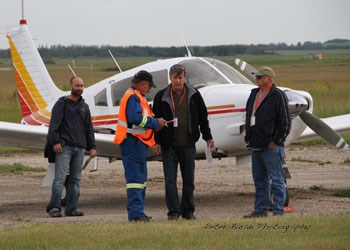The Civil Air Search and Rescue Association (CASARA) recently hosted the Western Canadian Search and Rescue Exercises at the Yorkton Municipal Airport. Thirteen planes flew 66 hours, with another 10 hours of flight by a communication airplane, to connect aircrafts over long distances.
Ray Sass with the planning committee says that the weekend was a success, with planes off the ground for most of the day and the different crews gaining new skills.
"We achieved our objective of making sure people were flying a lot, but at the same time they were learning and they were searching in an area that was unfamiliar for many of them."
The biggest advantage of an event like SAREX is the opportunity for different crews to meet and interact, Sass explains. Participants learned from each other, and observing the different methods that the various other teams used will change the ways some teams handle their tasks.
"Hopefully it will help them in their own province to do their activities and searching more effectively... There are sometimes better ways of doing things, and that's what we learn from these events."
Teams came from B.C., Alberta, Saskatchewan and Manitoba, with the biggest participation coming from Alberta.
Searching in Yorkton is different from what many of the crews are used to, Sass notes, because the terrain is more repetitive. For many of the search teams, they are used to more varied terrain, so searching in this region forces rescue teams to keep a keen eye to spot the targets they need. Sass uses the example of trying to find a white plane on the prairie.
"It's unbelievable how many white objects there are out in the prairies and Saskatchewan, so it kind of all blends in to everyone else. So you really have to be diligent and make sure the spotters pick up every little object, and hopefully the it's the target that you're looking for."
For crews, the change in scenery forces them to adapt to a new environment and keep their skills fresh, as each region has its own challenges and necessary skills.
"It's a change of environment, change of scenery, and a change of seeing how we do things out here in the prairies," Sass says.
SAREX rotates between the different provinces which participate. It will return to Saskatchewan in a five year period.




